
The Legion of Merit (LOM) is a military award of the United States Armed Forces that is given for exceptionally meritorious conduct in the performance of outstanding services and achievements. The decoration is issued to members of the eight uniformed services of the United States as well as to military and political figures of foreign governments.
The Conspicuous Service Cross (CSC) is a decoration (medal) of the Australian honours system. It is awarded to members of the Australian Defence Force "for outstanding devotion to duty or outstanding achievement in the application of exceptional skills, judgment or dedication, in non-warlike situations". In November 2019, 1129 people were listed as recipients. All ranks are eligible for the award.
The Conspicuous Service Medal (CSM) is a military decoration awarded to personnel of the Australian Defence Force, and officers and instructors of the Australian Defence Force Cadets. It is awarded for meritorious achievement or dedication to duty in non-war like situations. The CSM was introduced in 1989 and is a distinct Australian military award. It is the second level award of the Conspicuous Service Decorations in the Australian Honours System. Recipients of the Conspicuous Service Medal are entitled to use the post-nominal letters "CSM". Since its inception 1,021 had been awarded, plus a single Bar. All ranks are eligible for the award.

The Sea Gallantry Medal (SGM), is a United Kingdom award for civil gallantry at sea.

The Médaille de la Gendarmerie nationale is a French military decoration created on 5 September 1949 on proposition of the then Minister of Defence, mister Paul Ramadier. It was originally created in a single grade for award to officiers and NCOs of the Gendarmerie nationale who were cited in the orders of the entire service. Such a citation in the orders of the entire service, and all potential subsequent ones would be denoted by a grenade device on the ribbon as the medal could, and can still only be awarded once to any potential recipient. The medal could also be exceptionally awarded to persons not members of the service for important services rendered to the gendarmerie or for help during special missions. These presentations were made without a citation and thus without any ribbon device.
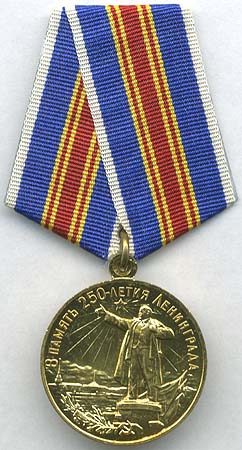
The Medal "In Commemoration of the 250th Anniversary of Leningrad" was a state commemorative medal of the Soviet Union established by decree of the Presidium of the Supreme Soviet of the USSR on May 16, 1957 to commemorate the 250th anniversary of the city of Leningrad. It was awarded to prominent members of Soviet society including veterans of the Great Patriotic War and serving members of the armed forces for wartime and peacetime services to the Hero-City of Leningrad.
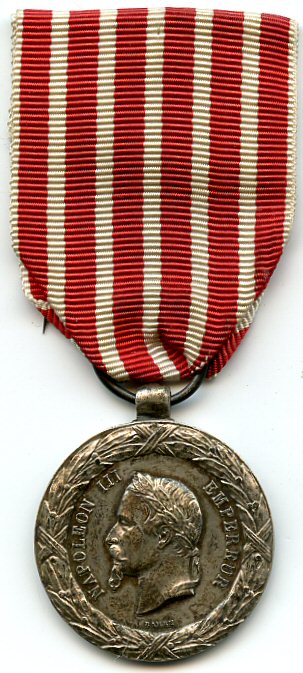
The Commemorative medal of the 1859 Italian Campaign was a French commemorative medal established by Napoleon III, following the 1859 French campaign in Italy during the Second Italian War of Independence.

The Medal "In Commemoration of the 850th Anniversary of Moscow" is a commemorative medal of the Russian Federation created to denote the 850th anniversary of the city of Moscow. It was established on 26 February 1997 by Presidential Decree № 132. Its statute was defined on 21 March 1997 by Presidential Decree 223.

The Pakistan Medal was established by King George VI in 1949 as a commemorative medal. The medal commemorates service during the period just before and after the creation of the independent Dominion of Pakistan on 14 August 1947. Most recipients were members of the armed forces of Pakistan, including attached British personnel.
The Malta George Cross Fiftieth Anniversary Medal is a commemorative medal created by the government of Malta and awarded by, or in the name of, the President of Malta. Established on 17 January 1992, it could be awarded to individuals who met the specified requirements of service and made application for award of the medal by 15 April 1994. The medal honours the collective award of the George Cross to the island of Malta during World War II.
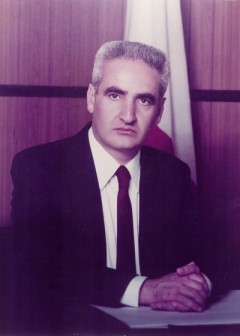
Karmenu Mifsud Bonnici, was a Maltese politician who served as Prime Minister of Malta from December 1984 to May 1987.

The National Order of Merit is a state order of the Republic of Malta. The order is divided into four grades that may be awarded to Maltese citizens.

The Queen Elisabeth Medal was a Belgian decoration created by royal decree in October 1916 to recognise exceptional services to Belgium in the relief of the suffering of its citizens during the First World War. Its statute was ratified on 14 May 1919. It was awarded to people, both Belgians and foreign nationals, who, like Queen Elisabeth herself, had worked and cared for the suffering victims of war for a year or more prior to 10 September 1919. Although not limited to medical care of the sick and wounded, recipients who earned the medal by working in hospitals received a variant with a red enamelled cross within the suspension wreath. A great many Belgian and foreign doctors and nurses received the medal.
The Malta Independence Fiftieth Anniversary Medal is a national commemorative medal of the Republic of Malta. The medal is awarded by the president of Malta to recognize contributions to the development and well-being of Malta as a nation and a member of the international community of nations since the State of Malta gained independence in 1964. The medal, which may be awarded posthumously, has been awarded to former presidents, prime ministers, and other notable Maltese politicians.
The current honours system of the Republic of Malta has its foundation in the 17 October 1975 Ġieh ir-Repubblika Act. This act has been subsequently amended by Acts XXXVII of 1976, XIII of 1983, XIV of 1990, XI of 1991 and XV of 1993; Legal Notice 423 of 2007; and Acts VI of 2008, V and XVII of 2011, and XIX of 2013. This act lays out the structure of the orders and medals of Malta. Subsidiary legislation spells out details missing in the initial act and also established national commemorative medals. The honours system of Malta can be broken down into three general parts, the National Order of Merit, Xirka Ġieħ ir-Repubblika, and Medals of the Republic.

The Medal for Bravery is a medal of the Republic of Malta. The medal is awarded by the President of Malta, with the written approval of the Prime Minister of Malta, for exceptional acts of bravery. The award is presented to Maltese citizens but may be awarded to foreigners on an honorary basis for acts which merit recognition by Malta. The medal may be awarded posthumously.
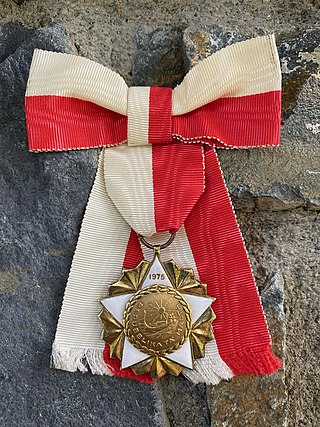
The Midalja għall-Qadi tar-Repubblika is a medal of the Republic of Malta. The medal is awarded by the President of Malta, with the written approval of the Prime Minister of Malta, for distinguished service to Malta. The award is presented to Maltese citizens and organizations, but may be awarded to foreigners on an honorary basis for service which merits recognition. No more than ten Maltese citizens may be awarded the medal over the course of a year. The medal may be awarded posthumously.

During the war of 1914-1918, the populations of the invaded and occupied regions of France were put under severe strain. Thus, at the end of hostilities, it seemed necessary to pay tribute to the courage of these people by rewarding them with several medals such as the Medal for victims of the invasion, the Medal of French Fidelity and the Medal for civilian prisoners, deportees and hostages of the 1914-1918 Great War. It was on the proposal of the Minister for the Liberated Regions that the Medal for victims of the invasion was created on 30 June 1921 in three classes.
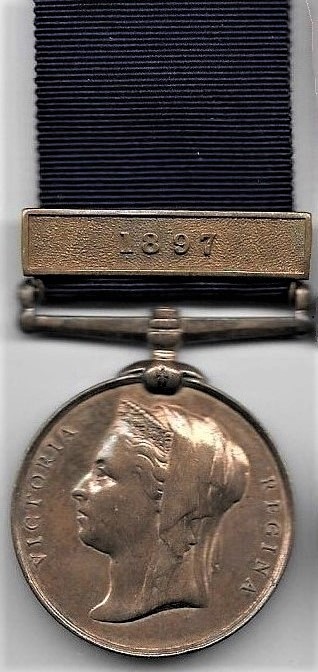
A Police Jubilee Medal was awarded to those on duty at Queen Victoria's Golden and Diamond Jubilee celebrations.

The Australian Corrections Medal (ACM) is a civil decoration awarded to Australian correctional service members for distinguished service. The ACM was introduced on 19 June 2017. Recipients of the Australian Corrections Medal are entitled to use the post-nominal letters "ACM".














